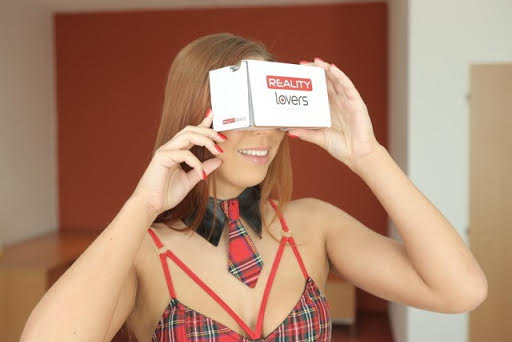Reality Lovers
Advances in Virtual Reality (VR) hardware and software have finally found synchronicity, putting endless experiential possibilities right at our fingertips. While gaming has driven the VR push, the adult entertainment industry is not far behind and will most likely see the biggest payday. At this point, it is critical to ask ourselves what this means for self-pleasure, relational sex and authentic connection.
Leading researchers in the field of technosexuality—or sextech—believe VR is an erotic game-changer. The introduction and continued development of immersive technology will bring a paradigm shift not only to the way people use pornography, but to the entire business of model of the adult entertainment world. Gone are the days when we simply watched porn—now we experience it. VR lets users realize mind-body pleasure, immersive sensation and simulated connection that feels effectively real. Utilizing VR takes users out of the position of externalized voyeur, rather immersing them in the scene for an internalized sense of involvement and indulgence. This most recent iteration of sextech is revolutionizing adult entertainment, making it better than it has been by putting an impetus on eroticism and the correlation to sexual health. By taking a sex-positive stance (all sex is good sex as long as it is consensual and pleasurable) and seeing these changes as empowering rather than shaming or derisive, there is an invaluable opportunity to positively affect people’s lives and the adult entertainment industry’s public image.
Dr. Holly Richmond is a somatic psychologist and Certified Sex Therapist in California who studies techno-sexuality and its effects on patients, as well as larger sociological implications. She fully supports the transition in the adult entertainment industry from 2-D to 3-D, not only for patients’ health, but for the positive shift it will elicit industry-wide. Over a decade ago, the advent of the adult “tube” sites triggered a negative impact on many adult entertainment corporations as well as performers because users no longer had to pay for content. Piracy was extensive and the quality of content and the image of the industry suffered. With the transition to 3-D, at least in the near future, users will be asked to pay for content, which will have a positive ripple effect throughout the industry. And to answer a burning question: Yes, VR content will be good enough that people will be willing to pay for it. For one, users will be able to select high-quality content that is specific to their erotic expression and desires. Two, the extent to which users experience pleasure will be sexually novel, emotionally and relationally expansive, and erotically amplified.
Dr. Richmond sees numerous benefits to utilizing VR. From a clinician’s perspective, and having access to VR content that bridges the gap between sexual entertainment and education is key. For example, if a male patient has issues with erectile dysfunction, Dr. Richmond could recommend a VR film shot from a male point of view (POV) that shows explicit techniques for achieving and maintaining an erection. Rather than simply being a viewer of the film, the man would feel immersed in and connected to the scene. Performing the techniques regularly encourages the resolution of his issues faster and more completely because he is participating in his progress rather than simply talking about it with a sex therapist or practicing by himself at home. The same is true for women, but to an even greater extent. The world is on the cusp of another sexual health revolution for women, which encourages them to take charge of their eroticism and be sexually empowered—VR is a key facilitator of this trend. For example, Dr. Richmond reports that the number one reason women see a sex therapist is for concerns with desire and arousal. Women want to be wanted, and moreover they want to want. VR content shot from a woman’s POV encourages self-exploration, knowing one’s body and arousal patterns, and knowing how to translate those techniques to relational sex. Dr. Richmond recently wrote and participated in the production of a series of films based on women’s desire that covered the latest and most effective sexual pleasure aids (sex toys), reinvigorating desire in long term relationships, and cultivating explicit erotic fantasy.
More generally, VR has additional benefits including sexual exploration for someone who is not comfortable being with a partner for either developmental or trauma-based reasons. VR can also decrease sexual inhibition and serve as “practice” sex for someone with social anxiety. Furthermore, VR has huge potential to cultivate empathy, Dr. Richmond believes. She hears reports from patients who choose to watch VR from an opposite sex perspective. For example, a large man watching POV from a petite woman’s perspective can feel a sense of identification and compassion for her, or a woman watching from a male POV may feel, for the first time, a sense of control and dominance in a sexual encounter.
VR is also ideal for couples who can utilize content that immerses them in a sensate focus protocol, which rebuilds pleasure and desire, and encourages frequent sexual connection. Sexual health is in no way exclusive of relational health, so giving couples tools to treat both is paramount. Sex therapists, who are licensed marriage and family therapists or psychologists, also frequently refer patients to sexological body workers or surrogate partner therapists. Often patients are unsure of what working with these practitioners entails, and VR is an ideal way for them to experience this intimate and hands-on works (something a sex therapist cannot do) before their first appointment. VR has the unique ability to give people a sense of competence and insight into the expansion of their sexual health.
In answering the question, “What’s next for sex?” Dr. Richmond and her colleagues believe VR is at the forefront of a movement toward improved sexual health. VR has the capability to not only be educational, but also, and perhaps most importantly, to be entertaining. Users will explore erotic fantasy in novel ways, discover their own pleasure, and learn improved skills for intimate relating in ways that are immersive and embodied. VR and the latest shift in techno-sexuality provides users with a felt sense that they were there, not merely that they were watching. The extent of the individual and relational sexual health benefits is limitless, with each person feeling more adept, self-assured and empowered within their own unique forms of sexual expression.




